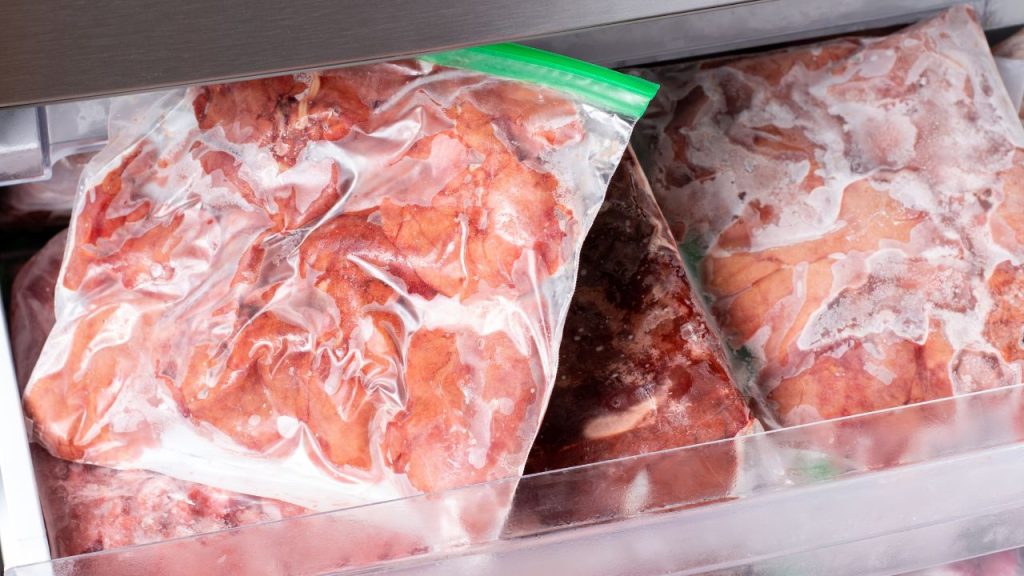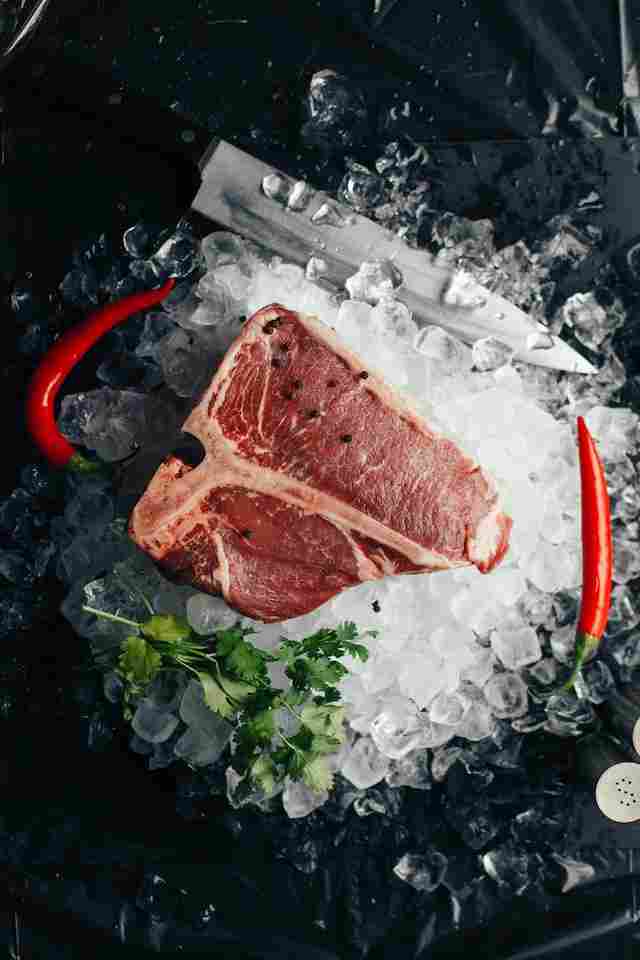Freezing meat is an easy way to preserve meat before it expires. Doing this allows you to buy meat in bulk and pop it in the freezer to use later.
When you purchase certain types of meat, it will contain information about the weight of the meat. This is important, especially when you are following a recipe.
Cooking times and ingredient proportions in recipes are set to the amount of meat required. Without correct proportions, meat can be cooked longer than needed or not long enough.
Have you ever brought a piece of meat and then weighed it again after letting it thaw and seen that the weight was different? Let’s talk about why this happens and how to get an accurate weight for your meat.
To many home cooks, frozen shrimp can sometimes look heavier than thawed shrimp. This makes us wonder if frozen shrimp really do weigh more than thawed shrimp, or is it just a trick? Let’s look at what happens to shrimp’s weight when it freezes and thaws.
Overview of Frozen vs. Thawed Shrimp
When shrimp is frozen, its temperature drops below its freezing point. This turns the water in its tissues from liquid to solid. This forms ice crystals that remain present when shrimp is frozen.
Thawing reverses this process, converting the ice back into liquid water that can then drip or evaporate from the shrimp This change in water content can potentially impact the weight before and after freezing.
Does Freezing Increase Shrimp Weight?
When shrimp is frozen, the water inside the tissue forms ice crystals, which take up more volume than liquid water. This increase in volume inside the cells can make frozen shrimp appear bulkier.
However, the overall weight change is generally minimal. Ice is less dense than liquid water, but the small amount converted to ice within shrimp does not drastically alter its mass.
So while frozen shrimp may seem heavier due to visual bulk, its actual weight is not significantly higher in most cases
Weight Loss During Thawing and Cooking
The more noticeable weight change occurs when shrimp is thawed. As the ice melts liquid water leaks out of the shrimp’s flesh. This moisture loss results in thawed shrimp weighing less than when frozen.
Additional water loss happens during cooking through evaporation. The combined moisture loss from thawing and cooking can decrease the final cooked weight by 10-30% compared to when frozen.
For example, 100 g of frozen shrimp may end up weighing only 80-90 g after thawing and cooking. This moisture loss impacts the final weight more than the freezing itself.
Key Factors That Influence Weight Change
Several key factors impact the magnitude of weight change in shrimp between freezing and thawing:
-
Shrimp size – Smaller shrimp have higher surface area relative to volume, increasing moisture loss. Larger shrimp better retain moisture.
-
Thawing method – Fast thawing via microwave or hot water can cause greater weeping of fluids and weight loss versus slow thawing in the fridge.
-
Cooking method – Dry heat methods like grilling lead to more moisture evaporation compared to moist-heat poaching or steaming.
-
Number of freeze/thaw cycles – Repeated freezing and thawing magnifies moisture loss and weight reduction.
So shrimp size, thawing/cooking methods, and number of times frozen influence final weight after defrosting.
Typical Weight Loss Percentages
Studies and culinary experts have revealed typical amounts of weight loss after freezing and thawing shrimp:
-
Raw small shrimp may lose 12-15% of their weight after thawing.
-
Raw large shrimp may lose 10-12% after thawing.
-
Raw shrimp thawed and then cooked may lose 25-30% of initial frozen weight.
These ranges can help you estimate the final yield when substituting frozen shrimp in recipes calling for fresh or thawed shrimp by weight.
Weighing Shrimp Before and After Freezing
If precision is needed for a recipe, you can conduct an experiment:
-
Weigh shrimp before freezing. Note exact weight.
-
Freeze shrimp for at least 24 hours to solidify completely.
-
Weigh frozen shrimp. Calculate % change from pre-frozen weight.
-
Thaw shrimp in refrigerator overnight. Blot dry.
-
Weigh thawed shrimp. Calculate new % change vs original weight.
This will reveal the exact moisture loss percentages for a given batch of shrimp frozen and thawed using specific methods. You can then adjust recipe amounts to compensate when cooking.
Accounting for Weight Changes in Recipes
To allow for moisture loss, you’ll need to use more frozen shrimp by weight compared to fresh or thawed. Here are some tips:
-
For stir-fries, allow an extra 1-2 oz frozen shrimp per serving.
-
Add 2-3 more frozen shrimp per skewer or piece when grilling or broiling.
-
Increase the frozen shrimp weight by 25% in casseroles or seafood boils.
-
Weigh thawed shrimp after cooking if needed for salads or dishes requiring precision.
With this guidance, you can adapt your recipes to yield the desired shrimp quantity after thawing and cooking losses.
Storing Thawed Shrimp to Minimize Additional Loss
To avoid further moisture loss after thawing shrimp:
-
Pat shrimp dry gently with paper towels before refrigerating.
-
Place in an airtight container or sealed bag.
-
Use within 1-2 days for best texture and flavor.
-
For longer storage, refreeze thawed shrimp immediately.
Proper storage minimizes excess weeping of fluids from thawed shrimp before use.
Key Takeaways
While the ice content in frozen shrimp may appear to add weight, the actual difference is negligible in most cases. The more significant weight change occurs during thawing and cooking due to water loss. Understanding this allows you to better estimate finished yields when substituting frozen for fresh shrimp based on moisture loss percentages. With proper planning, you can adapt recipes and storage to account for the lower weight of thawed and cooked shrimp compared to its frozen state.
Common Questions about Frozen Shrimp Weight
Here are some other frequently asked questions:
Why does my thawed shrimp look smaller than when frozen?
As ice crystals convert to liquid during thawing, the shrimp loses its bulk and appears smaller. This is due to water exiting the flesh, not the shrimp itself shrinking.
How can I reduce moisture loss when thawing shrimp?
Use a slow thawing method like refrigeration instead of rapid microwaving. Dry shrimp gently before storage or marinating. Handle delicately to avoid excessive weeping of fluids.
Should I increase cook times for frozen shrimp?
Yes, cook frozen shrimp 1-2 minutes longer than fresh or thawed to account for the time needed to thaw it through. Monitor closely and adjust time as needed.
Can I refreeze thawed shrimp?
It is safe to refreeze thawed shrimp, but quality decline may occur with repeated freeze-thaw cycles. Use refrozen shrimp within 3-6 months.
Does freezing shrimp change its texture?
Freezing can make shrimp slightly firmer due to ice crystal formation. Thawing and cooking returns it to a normal texture. Handling also impacts texture – avoid crushing or damaging frozen shrimp.
Should I press out extra water from thawed shrimp?
Gently patting thawed shrimp dry is sufficient. Avoid excess pressing or squeezing force during handling, as it can damage the delicate meat.

Is There a Huge Difference Between Frozen and Thawed Meat?

Comparison shows that there is a difference in weight, but it’s not that big. In fact, it depends on a number of factors.
The main deciding factor is the amount of moisture in each cut.
The amount of weight is small in most cases. Leaner cuts of meat have more water than fattier cuts of meat.
meat with higher-end cuts will always have less water content when compared with cheaper cuts. There will be more water in a fatty steak than in a lean cut of meat like chicken that is high in protein.
Cheaper cuts of meat have added fillers in them. Some meat, like mince, contains bread fillers, and some have added salt water to give it more flavor. In both cases, you will get a higher weight when the meat is frozen.
Does Frozen Meat Weigh More Than Thawed Meat?

Most types of meat will weigh more when they are frozen. How much they weigh will depend on factors like humidity levels and temperature. All types of meat contain natural moisture. When frozen, that moisture turns into ice crystals, and the liquid will expand. As a result, the weight of the meat will then change.
Different cuts and types of meat have varying water content, which changes their weight when frozen. Frozen meat weighs anywhere from 15-28% more than thawed meat.
When meat is defrosted, it will let out a juice that is called thaw exudate. The meat loses about 30% of its weight due to releasing this juice.
